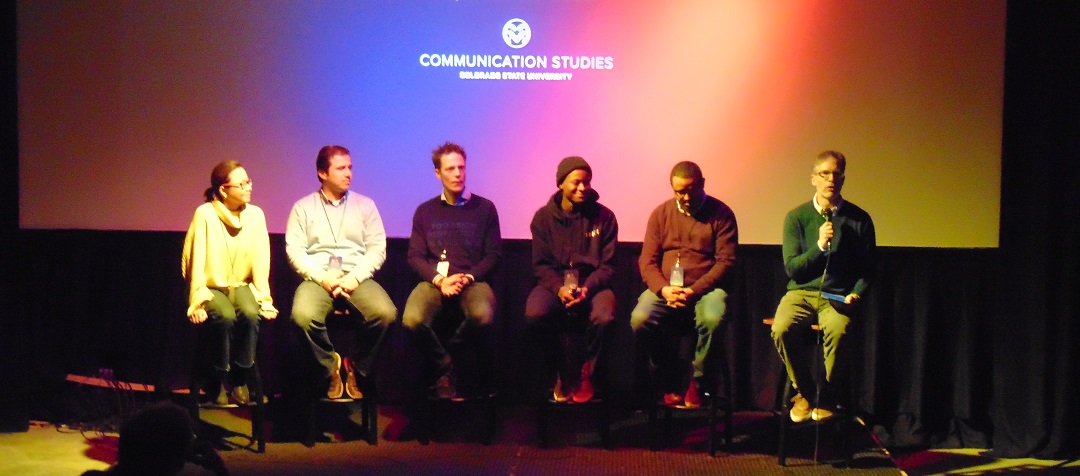For this year’s festival, ACT was able to bring 18 guests from the 13 films in the program to Fort Collins to participate in question and answer sessions with the audience following the screenings of their films. These guests came from around the world, including Europe, Africa, and the US, among others. These guests ranged from film directors and producers to actual film subjects. Question and answer sessions following screenings allow for the audience to process what they just saw, ask questions about the film making process, learn more about issues presented in the films, and even catch up with film subjects. Following a screening, an audience member may feel shaken from what they have seen and they often want to know more. Having directors, producers, film subjects, and topic experts present at the festival takes seeing the film a step further.
Filmmakers
Having filmmakers present is always a good thing. Directors and producers of the films can tell us what it was like creating the films before us. Whether we are asking them how long it took to make the film, how taxing it was, where they drew their inspiration, or what the film means to them, filmmakers give us a glimpse into what it’s like to be a documentary filmmaker. Directors and producers come from a variety of backgrounds and come to create their films from many different places. Some filmmakers are closer to their films than others, and each has a style of their own.
Mila Turajilic, director of The Other Side of Everything: Turajilic was born and raised in Belgrade, Serbia. She made her directorial debut in 2010 with Cinema Komunisto and released The Other Side of Everything in 2017. Her film is an intimate look into her family home and the politics behind the governmental changes over the course of three generations.
Patrick Hamm, producer of Freedom for the Wolf: Hamm hails originally from Germany. With a background in sociology, Patrick and director Rupert Russel decided to make a documentary about a quote by philosopher Isaiah Berlin: “Freedom for the wolves has often meant death to the sheep.”
Camilla Hall, producer of Freedom for the Wolf: Hall is a documentary director and producer from London. A former print journalist, Camilla left her career to a part of the Freedom for the Wolf project with Hamm and Russel in 2014. The film made its debut at Sheffield Documentary festival in 2017.
Louai Haffar, producer of A Memory in Khaki: Haffar comes from Syria, where he produced the film with director Alfoz Tanjour. The film is a striking look at the aftermath of the Syrian Civil War.
Diane Quon, producer of Minding the Gap: Quon, who is originally from Chicago, is a documentary filmmaker. While working at Paramount Pictures as the Vice President of marketing, she felt the need to make films that matter. She has worked on various documentaries since 2015, including Minding the Gap.
Dieudo Hamadi, director of Mama Colonel: Hamadi was born in the Democratic Republic of Congo, the setting for Mama Colonel. Creator of many documentaries, Hamadi’s films are award-winning.
Amanda Kamanchek Lemos, director of Chega de Fiu Fiu: Lemos, alongside co-director Fernanda Frazão, focuses on three women who are demoralized in the streets of their respective Brazilian cities. Lemos and Frazão point to the Brazilian cities’ unfriendliness to pedestrian safety.
Lucas Kakuda, director of photography for Chega de Fiu Fiu: Kakuda is a Brazilian cinematographer. He uses his camera eye to capture the challenging stories of the three subjects and comes to us to discuss shooting a story about gender-based struggles in Brazil.
Heather White, director of Complicit: White is a human rights advocate, author, and first-time film director. She decided to make Complicit when reading in a Chinese newspaper about rehab clinics for ill employees of global factories nearly 10 years before the film’s completion.
Stevie Salas, executive producer of Rumble: The Indians Who Rocked the World: Salas is a guitar player and composer. He has written, composed, and produced dozens of albums, including some film scores. He comes to Rumble as an activist for indigenous communities. Salas will receive the Harry Belafonte Resistance Through Art Award at our festival this year.
Christina Fon, producer of Rumble: The Indians Who Rocked the World: Fon is an accomplished film and television producer. She has won several awards for her filmmaking and continues to produce media about indigenous populations.
Film Subjects
In addition to having filmmakers, having film subjects here is quite exciting. Not only does it make many of us feel starstruck to see in person the people we have been watching on screen, but it also gives the audience a chance to ask them questions about their lives. When audience members see a film subject in person, it sinks in that this is a real person and the events in the film really happened. Audience members often want to check in on the subjects and see how things are going in their lives. Are you still living in the home the documentary was shot in? Have you seen any changes since the film? Are you still in touch with other film subjects? How is your work going? They also want to know what it was like having a camera follow them around for weeks, months, and for some even years. In addition, many of the film subjects are activists and audiences are often so moved by the portrayals in the films that they want to know how they can help, where they can donate to, where they can volunteer to lend a hand.
